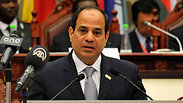
Al-Sisi is not Israel's friend, he's a partner
Analysis: Coordination between Cairo and Jerusalem is intimate and tight, but Egyptian leader isn't ready for a real change in relations with Israel.
People here went so far, that a cartoonist from the bad guys' side drew al-Sisi wrapped with a flag of Israel, dialing the red phone to Prime Minister Benjamin Netanyahu's office in Jerusalem to receive instructions for the negotiations with the Hamas delegation.
Egyptians I have spoken to paint a different picture of al-Sisi. He is focused on his goal, and the Gaza issue is only one of the urgent issues on his desk. He knows that time is not in his favor, he has two years to present the Egyptians with achievements, mainly economic ones, and introduce a new security-related order in Egypt.
But al-Sisi is no one's friend. On the contrary. From the moment he entered the presidential palace, he has been acting with the suspicion characterizing rulers who only rely on themselves. Too many enemies, too many people awaiting his downfall, and too many problems that could get him into trouble.
Al-Sisi is well aware of official Israeli emissaries' persuasion trips to Washington in a bid to explain to the Obama administration that it's time to forget about Egypt's Islamists and let Sisi off the hook for the ouster of his predecessor, Mohamed Morsi.
There is no dispute that the Israeli activity contributed to the resumption of military aid to Egypt and to Obama's realization that Egypt is worthy of regaining the role of a key player. When we failed to neutralize the White House's odd tendency to go for the Qatari and Turkish option, the Israeli and Egyptian joining of forces did the job.
From his previous role as head of military intelligence, al-Sisi is deeply familiar with the issue of Gaza's tunnels. He declared war on them before us (the Egyptians say they have destroyed 1,630 tunnels), and the Egyptian army doesn't make phone calls and doesn’t send warning missiles.
Al-Sisi has a lot of experience with Hamas and the Muslim Brotherhood movement. When he was admitted into the Supreme Council of the Armed Forces which ran Egypt immediately after President Hosni Mubarak was ousted, he was put in charge – not incidentally – of the connection to the Islamists.
Everything he learned about them and about the link between radical Islam and terror organizations led him to pursue the Muslim Brotherhood leaders and sit on the presidential throne in order to put Egypt on a sane path.
All this doesn't mean that al-Sisi is a friend of Israel. Al-Sisi is a partner. His opinion about Khaled Mashal and the military wings in Gaza is worse than ours. I am told that behind the closed doors in the Mukhabarat (General Intelligence Directorate) headquarters in Cairo, the Egyptian team is tougher towards Hamas than the Israeli team.
Al-Sisi has no intention of being anyone's puppet. He has an interest board. He is now busy with the ambitious project of building the second Suez Canal. He has promised to create millions of new workplaces for Egypt's unemployed, and he has a problem in the form of two million laborers fleeing Libya now with no livelihood guarantee.
He has to deal with several African countries' scheme to divert the Nile's course, and the Muslim Brotherhood are still lurking to bring him down.
Beyond the focused issue of arranging a ceasefire in Gaza, the Egyptian leader is still not ready for a real change in the relations with us. Let's see if they suggest expanding the thriving QIZ (Qualifying Industrial Zones) economic project (the joint textile industries, which are working at the lowest profile and generating millions). Let's see if Egypt sends a new ambassador here. Let's see if Israelis receive entry visas to Egypt and if Egyptians come to Israel.
An open visit by an Israeli VIP is out of the question. The Egyptian partner sustains relations on the phone. The coordination is intimate and tight, and there is a common language, but we have yet to solve the al-Sisi enigma.










